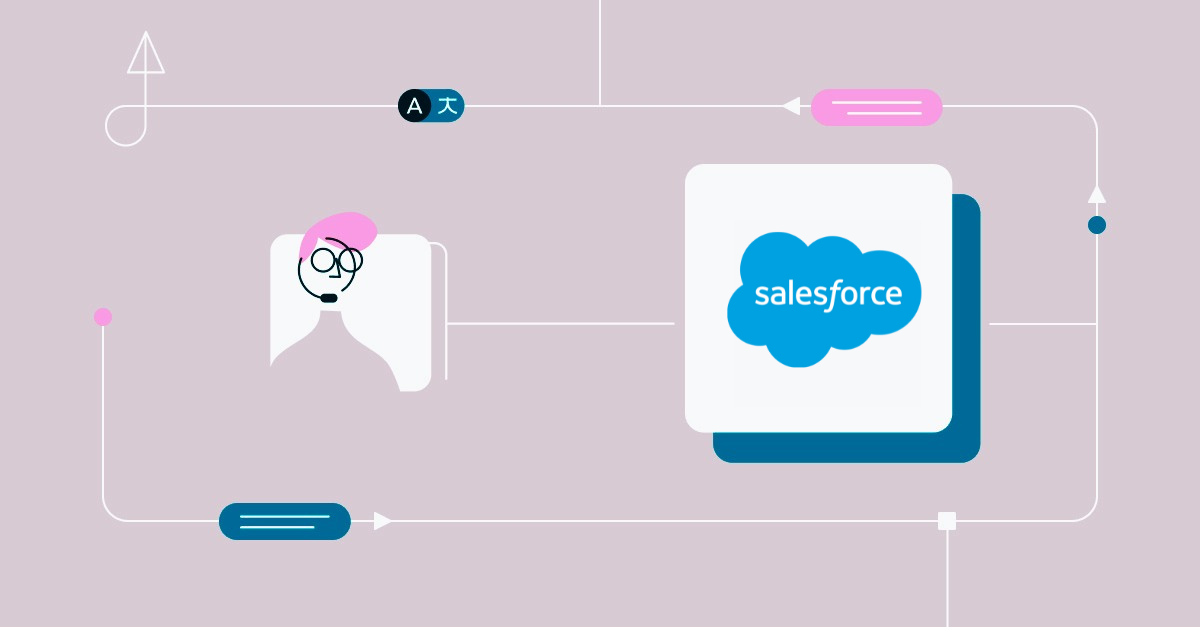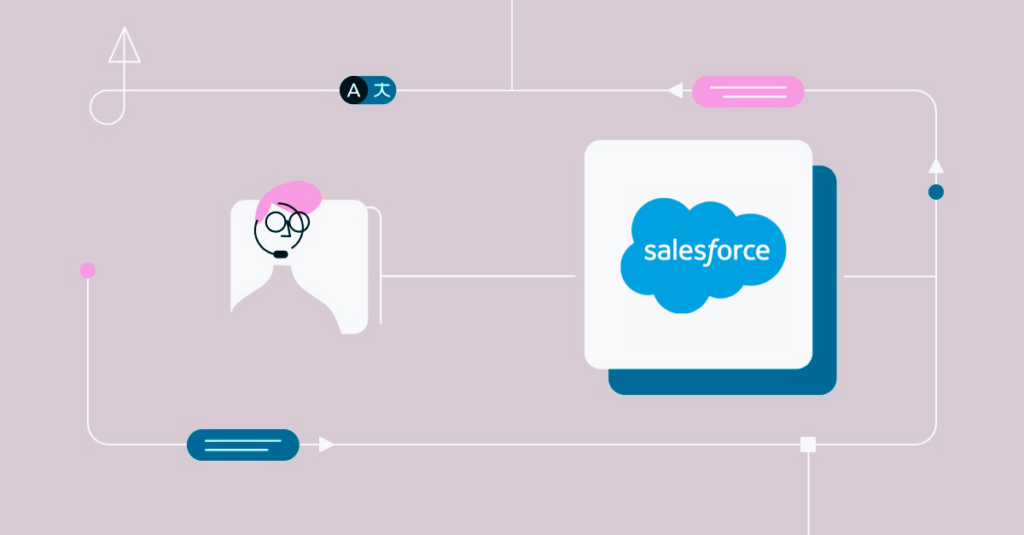Deliver exceptional customer experiences worldwide with Unbabel’s Salesforce Service Cloud integrations
Salesforce multilingual integrations empower your support teams to have productive conversations with customers and resolve inquiries across a range of languages and global markets.
There are a variety of translation tools available for business use today that perform basic translation tasks. But utilizing an end-to-end Plateforme LangOps, that was designed specifically to address the challenges faced by the customer support industry and integrates directly to your preferred CRM, can truly elevate your business’s CX strategy, keep teams lean, and improve vital metrics such as CSAT (Customer Satisfaction score) and FRT (First Response Time).
Let’s take a look at how businesses can — and why they should — optimize their existing Salesforce workflows to incorporate enhanced multilingual integrations, featuring special commentary from Tigh Loughhead, Founder of Forcery, 5X Salesforce MVP, as he introduces Unbabel’s AppExchange solution.
A unified, high-quality global CX
As a customer-driven organization, you want your customers in Germany to have the same great customer support experience as your customers in Japan, and you want CSAT scores to reflect that. Providing a unified CX should be a top priority for any organization, but when you’re serving customers in multiple languages, often with an omnichannel approach, service quality stakes are raised.
Unbabel’s 2021 Global Multilingual CX Report uncovered that 71% of global consumers believe it is “very to extremely important” that a brand promotes and supports its products and services in their native language. 68% of consumers would switch to a different brand that offers support in their native language.
Beyond language availability, businesses need to maintain quality support to build great customer relationships and keep customers satisfied. The same report revealed that 92% of global consumers’ trust and loyalty toward a brand will be impacted a “moderate amount” to a “great deal” if they receive poor-quality support in their native language. This is a significant finding, as even a small number of detractors can tarnish your company’s reputation.
One of the biggest challenges businesses encounter when expanding into new markets is the inability to provide fast, accurate, and quality customer support to each individual market they serve, along with the costs of investing in tools and resources to get there. As we’ve previously touched upon, machine translation tools alone are not viable business solutions.
However, integrating a multilingual API Salesforce solution — one that offers a unique combination of MT + human editors — solves the staffing and quality of service issues in one fell swoop. It allows businesses to deliver a five-star CX across languages, without the need to hire native speakers to accommodate every market they support. It also helps alleviate contact center staffing constraints and reduce response times for languages where it is difficult to source native-speaking agents.
Native-quality translations inside existing workflows
An integrated CRM translation solution that boasts the efficiency of automation and augmented machine translation, plus the local nuance of our post-editors, should serve as an invisible layer between your agents and your global customer base, automatically translating conversations for faster, better-quality support. It should be so seamless that you would never be able to recognize that the CS agent on the receiving end speaks a completely different language than the inquirer.
This single-pane-of-glass approach proves far superior to routing tickets from your CRM to your translation tool and back again — which is both inefficient and highly inaccurate, and serves only as an invitation for errors.
The payoff is that your already-great agents are now effectively multilingual and will be able to scale the exceptional work they’ve been doing across a range of languages, with no added hassle or disruption to existing workflows. Eliminating the middleman that is the language barrier allows you to hire exclusively for support and technical skills — not based on language — while boosting agent productivity and building leaner, more efficient teams.
Improve valuable customer support KPIs
Modern customer service solutions need to enable you to maintain and improve customer-centric KPIs, like Customer Satisfaction score (CSAT), Net Promoter Score (NPS), and Customer Effort Score (CES). It’s also likely that your support team is monitoring operational metrics related to efficiency, such as First Response Time (FRT) and First Contact Resolution Rate (FCR).
Imagine having a centralized hub that visualizes valuable insights and KPIs related to customer satisfaction, turnaround times, and agent performance. Would your customer service teams benefit from having the ability to filter translations and conversations by channel, language pair, or historical date range so you can see on the same dashboard how metrics are changing over time?
What does that look like? Logitech used this type of language translation hub to reduce ticket response times by 75% and raise NPS for translated conversations by 58 points. It was also able to increase staffing efficiency by 45% while keeping spending flat.
So what tool is right for me?
Let’s ask Forcery’s Tigh Loughhead — a 5X Salesforce MVP, 6x Salesforce Certified Marketing Champion, 5X Dreamforce speaker, and Founder of RentBoost, a Salesforce Pardot and Marketing Cloud Certified marketing technology consultancy and Google Partner agency in NYC.
He recently conducted an interview to understand how Unbabel integrates with Salesforce Service Cloud on Cases (support tickets) and Chat (Live Agent) to help businesses deliver a more efficient and far superior CX for customers, no matter where they are in the world.

Below is a summary of Unbabel’s unique integration features:
Service Cloud Chat (Live Agent)
Unbabel integrates with Service Cloud Chat (Live Agent) to enable real-time conversations — inbound and outbound — from the customer’s native language to the language of the agent’s choice. CS teams can also train our MT engines just like they’d train any other human agent: You share with them your style guides, glossaries, and key terminology to ensure your messaging is consistent, current, and specific to your industry.
Take the word clutch, for example. A fashion company would use it to describe a type of purse, while an automobile company would use it when referring to a car part. And for the younger generations in the gaming and media industry, clutch means ‘cool.’
Context and personalization are paramount when translating words and idioms. Unbabel was built with this in mind, and its integration with Salesforce unlocks priceless functionalities that will help CS teams be more precise when communicating in any language.
Service Cloud Cases
As for Cases, also known as support tickets, there is more of a need for message quality or language refinement. Our proprietary Quality Estimation tool determines whether or not to bring a human into the loop for further review and some extra TLC, which naturally requires an additional few minutes added to the process.
Take idioms, for example. Have you ever tried using Google to translate the phrase let’s play it by ear from English into Spanish? We did, and unless you are planning to (physically) play with your customer’s hearing, such literal translations become meaningless.
Additionally, our advanced AI learns from conversations over time, so words and phrases that are used consistently throughout your organization become recognized and automated.
With the precision and speed of our technology combined with the quality of local experts, who are native speakers in the languages we support, we deliver solutions that are custom to your case management and business needs.
To learn more about how Unbabel can elevate the customer success strategy of Salesforce customers, watch our full video interview with Tigh Loughhead — or test out our self-service platform today, entirely for free.












